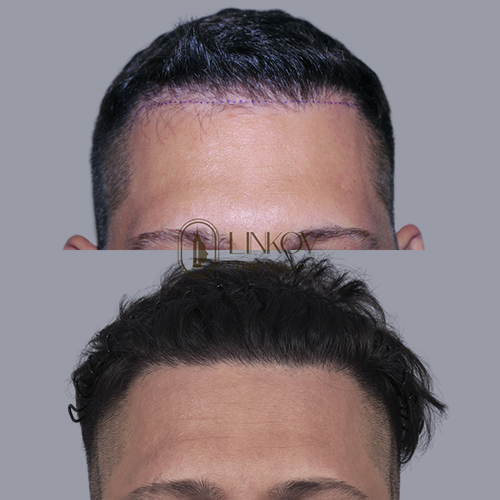Central Centrifugal Cicatricial Alopecia Doctors NYC
Central centrifugal cicatricial alopecia a medical condition that causes you to lose your hair. Since it damages the hair pores as well as the follicles, you can lose your hair permanently if you don’t have it treated when you first begin noticing your hair loss. The place to turn, both for a definite diagnosis and effective treatment, is Linkov Hair Surgery in Manhattan. Dr. Gary Linkov is compassionate toward his patients, and he gives you real options for treating and even reversing your condition. Call today to schedule a consultation.

What Is Central Centrifugal Cicatricial Alopecia?
Central centrifugal cicatricial alopecia (CCCA) is a scarring alopecia on the scalp that leads to hair follicle damage. With damage to the tiny pores that allow hair growth, you experience permanent hair loss. This scarring hair loss is most common among black women, although in rare cases, men and women from other races also suffer CCCA.
Early diagnosis and treatment protect hair follicles and prevent the outward spread of hair loss. At the Manhattan-based Linkov Hair Surgery, you can be evaluated and treated by Dr. Gary Linkov, a double board certified facial plastic surgeon and a member of the International Society of Hair Restoration Surgery. He and his team offer advanced hair loss treatments for men and for women.


Do I Have Central Centrifugal Cicatricial Alopecia?
Central centrifugal cicatricial alopecia presents different symptoms. Some are similar to other types of hair loss, so you need a hair loss specialist to determine the exact cause of your hair loss. Dr. Linkov looks for specific signs before further tests rule out other causes of your hair loss. Signs that you have CCCA include:
- No visible hair loss in the early stage of the condition, but your hairs are more fragile and shorter than normal
- The affected scalp becomes bare, smooth, hairless and shiny
- A typical hair loss pattern that starts at your mid-scalp and extends outward in a centrifugal manner
- Loss of the follicular openings
- Redness, scaling and pigmentation of your scalp
- Tenderness, itching and burning sensations in your scalp
- Scalp scarring
- A lot of hair breakage, leading to progressive hair loss
- Pustules or draining sinuses
- Acne-like bumps in the hair loss site on the top of your head, later spreading down
At the state-of-the-art Manhattan hair restoration clinic, Dr. Linkov and his team use modern diagnostic procedures and equipment. With a diagnosis, the hair restoration specialist develops a tailored CCCA treatment plan that’s affordable and effective.
Should I Worry about Central Centrifugal Cicatricial Alopecia?
Hair loss has a significant effect on your quality of life. Central centrifugal cicatricial alopecia comes with severe symptoms that affect both your physical and mental health. Some reasons to worry about CCCA include:
- Hair loss caused by CCCA is noticeable.
- Hair loss lowers your self-esteem, causing you to spend less time socializing.
- You may tend to withdraw from an active lifestyle, leading to lifestyle diseases such as type 2 diabetes.
- Managing hair loss may lead to stress, depression, and other psychological problems.
For a woman, the loss of hair directly affects self-identity, leading to myriad problems. With an early diagnosis, your New York Linkov Hair Surgery doctor helps you manage your hair loss more effectively.

What Causes Central Centrifugal Cicatricial Alopecia?
The cause of central centrifugal cicatricial alopecia isn’t known, but research continues to discover more about the condition. Some explanations for CCCA include:
- Inflammation affecting hair follicles at the stem cells and sebaceous gland
- Some hair care practices, which damage hair follicles, such as relaxers, hot comb treatments and weaves
- Damage to the stem cells and sebaceous gland that leads to the permanent loss of hair follicles
- Hair damage by fungal or bacterial infections
- Genetic mutation of gene PADI3, which affects proteins involved in the formation of the hair shaft
- Autoimmune disease, which attacks healthy tissue, including hair follicles
Your doctor at Linkov Hair Surgery examines you to reach a diagnosis about the exact cause of your hair loss during your initial consultation. This experienced specialist understands all hair loss types, including CCCA, androgenetic alopecia, telogen effluvium, anagen effluvium, alopecia areata and tinea capitis.
Am I at Risk of Central Centrifugal Cicatricial Alopecia?
As studies continue to identify the actual cause of CCCA, doctors identify categories of people more at risk of this type of hair loss. You may be at risk if you fall into one or more categories, such as:
- African America women
- Having an autoimmune predisposition
- At risk of fibrosis and keloid scars
- Women suffering from uterine fibroids
CCCA may be associated with type 2 diabetes mellitus, which puts you in a higher risk of developing bacterial scalp infections. Multiple factors are behind the etiology of central centrifugal cicatricial alopecia. Your doctor may explain how infections, autoimmune disease or genetic factors all contribute to CCCA.
What’s the Treatment for Central Centrifugal Cicatricial Alopecia?
The goal of treatment for CCCA is to stop further progression of hair loss. Regrowth of hair is possible if you act fast to halt damage to your hair follicles. Some treatment and control techniques for central centrifugal cicatricial alopecia include:
Diagnosis The first step toward treatment is discussing your symptoms with your doctor and reviewing your medical history. The doctor may then carry out some diagnostic tests to confirm or eliminate other causes. Your diagnosis guides the treatment you receive.
Anti-inflammatory medications The use of anti-inflammatory medications may slow or prevent CCCA symptoms. Topical steroids, hydroxychloroquine to induce hair regrowth and immunosuppressive drugs that suppress the immune system may work.
Hair loss treatment medications After diagnosis, your hair treatment doctor may recommend a topical medication, such as minoxidil or finasteride.
Injections of corticosteroids One of the most effective methods of regrowing hair is the use of cortisone injections. This minimally invasive procedure reduces hair thinning or hair loss. You need multiple sessions over a period of months to see the improvements.
Laser therapies The use of low-level laser light penetrates the scalp to improve blood circulation and hair growth.
Hair transplants If you control central centrifugal cicatricial alopecia for some months, a hair transplant is a surgical treatment. Advanced procedures used in hair grafting include follicular unit extraction, follicular unit transplantation and Neograft hair transplant.
Hair replacement systems Wigs and weaves offer temporary relief, but they allow you to overcome the stigma associated with hair loss.
Change of hair care practices Some of your favorite hair grooming habits may be making your hair loss worse. Stop harmful hair-grooming practices, such as the use of relaxers, heat application tight braids, weaves or extensions. Also, anti-dandruff shampoos ease scalp itching or flaking, allowing a fuller growth of hair.
The hair loss treatment doctors have experience in CCCA treatment and other types of hair loss. Once you’re diagnosed with of central centrifugal cicatricial alopecia, you should seek immediate guidance and support. Contact the best hair restoration specialist at Linkov Hair Surgery, Manhattan’s best hair restoration office.
Linkov Hair Surgery
150 E 56th St, #1A
New York, NY 10022
(212) 970-9404

